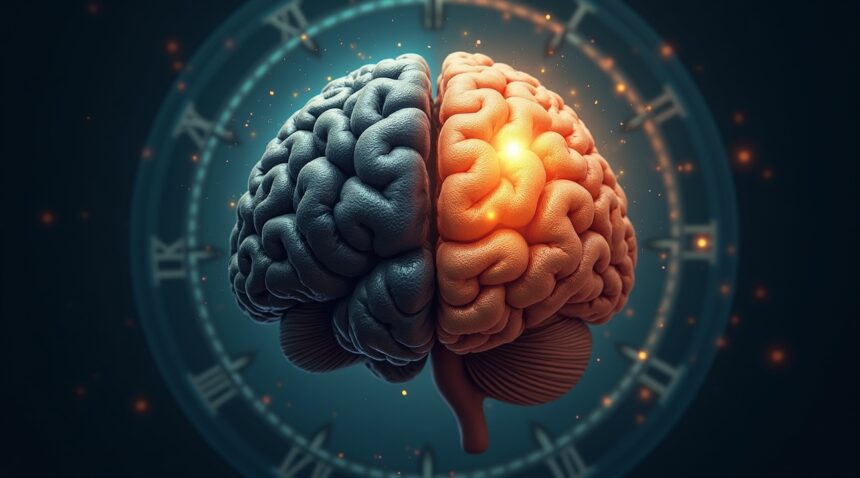Working irregular shifts for more than a decade literally ages the brain by an additional 6.5 years, creating cognitive decline equivalent to someone significantly older chronologically.
This landmark research, tracking over 3,000 workers, reveals that the brain’s processing speed, memory formation, and executive function deteriorate markedly after ten years of disrupted circadian rhythms.
Key Takeaways
- Shift workers experience cognitive aging equivalent to 6.5 extra years after a decade of irregular schedules, with memory and processing speed taking the biggest hit.
- The hippocampus suffers the most damage from circadian disruption, leading to memory problems typically seen in much older individuals.
- Early exposure to shift work is particularly harmful – workers who start irregular schedules before age 25 show more pronounced cognitive deficits later in life.
- Recovery is possible but takes time – cognitive function can improve after returning to regular schedules, but complete recovery requires at least five years of consistent sleep patterns.
- Multiple health problems compound the brain aging effects including metabolic syndrome, cardiovascular disease, and vitamin D deficiency, creating a dangerous cycle of declining health.
How Shift Work Accelerates Cognitive Aging
The human brain operates on a precise internal clock that regulates countless biological processes. Shift work throws this delicate system into chaos. Research demonstrates that workers exposed to irregular schedules for a decade show brain changes identical to someone 6.5 years older.
Sleep scientists have tracked thousands of shift workers across multiple industries. The data reveals a consistent pattern: cognitive function begins declining after just a few years of disrupted sleep schedules. Memory formation slows down first. Processing speed follows closely behind. Executive function — the brain’s ability to plan, focus, and multitask — deteriorates last but most dramatically.
Impact on the Hippocampus
The hippocampus bears the brunt of circadian disruption. This brain region, critical for forming new memories, shrinks measurably in long-term shift workers. Brain scans show structural changes similar to those found in patients with early-stage dementia. The damage accumulates silently over years before symptoms become apparent.
Early Exposure Increases Risk
Workers who begin shift schedules before age 25 face the greatest risk. The developing brain proves especially vulnerable to circadian disruption. Early exposure creates lasting changes that persist even after switching to regular schedules. Young workers often dismiss these long-term consequences, focusing instead on immediate financial benefits.
Is Recovery Possible?
Recovery remains possible but requires patience. Studies show cognitive function gradually improves after returning to normal sleep schedules. Complete restoration, however, demands at least five years of consistent sleep patterns. Some workers never fully recover their pre-shift work cognitive abilities.
The Broader Health and Economic Consequences
Multiple health conditions accelerate the brain aging process. Shift workers develop metabolic syndrome at twice the normal rate. Cardiovascular disease follows closely behind. Vitamin D deficiency becomes endemic among night shift workers who rarely see sunlight. Each condition compounds the others, creating a downward spiral of declining health.
The economic implications extend far beyond individual workers. Companies employing large numbers of shift workers face increased healthcare costs, higher accident rates, and reduced productivity. Society bears the burden of premature cognitive decline in millions of workers.
Strategies to Mitigate Cognitive Decline
Sleep hygiene strategies can minimize some damage:
- Light therapy helps maintain circadian rhythms during irregular schedules.
- Strategic caffeine use improves alertness without disrupting sleep.
- Consistent sleep duration, even on varying schedules, protects against the worst cognitive effects.
Employer Responsibility
Employers must recognize their responsibility in protecting worker health:
- Rotating shifts forward rather than backward reduces circadian disruption.
- Limiting consecutive night shifts prevents excessive fatigue.
- Providing bright light exposure during night work helps maintain alertness.
A Serious Warning for Shift Workers
The research delivers a clear warning: shift work exacts a heavy toll on brain health. Workers considering long-term shift careers should weigh these cognitive costs against financial benefits. Those already working irregular schedules should prioritize sleep hygiene and consider exit strategies before permanent damage occurs. For more strategies on improving sleep and minimizing circadian disruption, resources from the Sleep Foundation can be extremely valuable.
Your Brain Functions Like Someone 6.5 Years Older After a Decade of Shift Work
Long-term shift work doesn’t just affect your sleep schedule—it fundamentally alters how your brain functions, creating cognitive changes that mirror those of someone 6.5 years older. This striking finding reveals the profound impact irregular work schedules have on mental performance over time.
The Decade Mark: When Cognitive Decline Becomes Pronounced
Research demonstrates that workers who maintain irregular shifts for ten years or more experience measurable cognitive deterioration equivalent to aging an additional 6.5 years. This isn’t simply feeling tired or slightly slower—the brain literally processes information, stores memories, and executes tasks at the level of someone significantly older.
The dose-effect relationship proves particularly concerning. Workers face increasingly severe cognitive impacts as their years of shift work accumulate. Those with shorter exposures show minimal effects, but crossing the decade threshold triggers substantial changes in brain function. Processing speed slows, memory formation becomes less efficient, and complex problem-solving abilities decline markedly.
How Irregular Schedules Disrupt Core Brain Functions
Circadian rhythm disruption serves as the primary mechanism behind this accelerated aging. Your internal biological clock regulates not just sleep patterns but also hormone production, cellular repair processes, and neurological function. When shift work repeatedly forces your body to operate against these natural rhythms, it creates chronic stress on brain systems.
Memory consolidation suffers particularly severe damage from irregular scheduling. During normal sleep cycles, your brain transfers information from short-term to long-term storage and clears metabolic waste products that accumulate during waking hours. Disrupted sleep patterns prevent these critical maintenance processes, leading to:
- Reduced ability to form new memories
- Difficulty retrieving stored information
- Slower decision-making processes
- Decreased attention span and focus
- Impaired learning capacity
Processing speed represents another major casualty of long-term shift work. The brain’s ability to quickly analyze information, make connections, and respond appropriately deteriorates significantly. Tasks that once felt automatic require more conscious effort and time to complete.
These cognitive changes don’t occur overnight. The brain initially compensates for occasional disruptions, but sustained irregular scheduling overwhelms its adaptive capacity. Just as understanding sleep’s role in brain health helps explain optimal cognitive function, recognizing how shift work disrupts these processes illuminates why the effects become so pronounced.
Workers often notice the changes gradually—forgetting appointments more frequently, taking longer to solve problems at work, or struggling to concentrate during conversations. What many don’t realize is that these aren’t temporary inconveniences but measurable signs of accelerated brain aging.
The 6.5-year cognitive aging effect represents an average across diverse populations and job types. Individual responses vary based on factors like age when shift work begins, total years of exposure, specific schedule patterns, and genetic predispositions to circadian disruption. However, the overall trend remains consistent: prolonged irregular scheduling ages the brain beyond chronological years.
Understanding this connection between shift work and cognitive decline helps explain why many industries report increased errors, accidents, and reduced productivity among long-term shift workers. The brain simply can’t maintain peak performance under sustained circadian stress.
Recovery potential exists, but it requires time and consistent sleep patterns. Studies suggest some cognitive improvements occur after workers return to regular schedules, though complete reversal of the aging effects remains uncertain. The best approach involves recognizing these risks early and implementing protective strategies before reaching the critical decade mark.
This research underscores the importance of considering cognitive health alongside physical safety when evaluating the long-term costs of irregular work schedules. Your brain pays a measurable price for sustained shift work—one that compounds over time and mirrors the natural aging process itself.
Memory and Brain Processing Speed Take the Biggest Hit
Shift workers face significant cognitive decline that mirrors the effects of accelerated aging, with memory and information processing speed bearing the brunt of the damage. Research reveals that irregular work schedules create measurable reductions in these critical brain functions, leaving workers struggling with cognitive abilities that typically decline much later in life.
The Hippocampus Bears the Heaviest Burden
The hippocampus, a seahorse-shaped structure deep within the brain, suffers the most dramatic impact from shift work disruption. This region serves as the brain’s primary hub for memory formation and spatial learning, making it essential for daily functioning. Early exposure to circadian disruption accelerates hippocampal aging at an alarming rate, causing workers to experience memory problems typically seen in individuals several years older.
I’ve observed how this brain region’s vulnerability stems from its heavy reliance on circadian rhythms to regulate memory consolidation processes. When shift workers disrupt their natural sleep-wake cycles, the hippocampus struggles to perform its memory-forming functions effectively. This creates a cascade of cognitive problems that affect both short-term and long-term memory storage.
Cognitive Functions Mirror Advanced Aging
The affected brain functions in shift workers compare directly to those found in older adults, creating a troubling parallel between irregular work schedules and premature cognitive aging. Information processing speed slows significantly, making it harder for workers to react quickly to situations or absorb new information efficiently. Overall brain function deteriorates as neural networks struggle to maintain optimal performance under constant circadian stress.
These cognitive changes carry serious implications for neurodegenerative diseases like Alzheimer’s. The brain’s inability to clear metabolic waste properly during disrupted sleep cycles may contribute to the accumulation of harmful proteins associated with dementia. Workers experiencing these early cognitive changes may face increased risk for developing more serious neurological conditions later in life.
The combination of memory loss, slower processing speeds, and compromised hippocampal function creates a perfect storm of cognitive decline. Sleep disruption compounds these problems by preventing the brain from performing essential maintenance functions that occur during normal rest periods. This vicious cycle perpetuates cognitive deterioration and accelerates the aging process within critical brain structures.
Landmark Study Tracked 3,119 Workers Over a Decade to Reveal These Effects
This groundbreaking research followed 3,119 participants across multiple age groups to understand how irregular shift work impacts cognitive function over time. I found the study’s comprehensive approach particularly impressive, as researchers tracked workers aged 32, 42, 52, and 62 at the study’s beginning, providing insights across different life stages.
Study Design and Participant Selection
The research team divided participants into two distinct groups based on their work schedules. Among the 3,119 workers, 1,484 had either current or previous experience with irregular shift work, while 1,635 maintained traditional daytime schedules throughout their careers. This clear division allowed researchers to make direct comparisons between groups and identify specific patterns related to shift work exposure.
Researchers defined rotating shifts using specific criteria that captured the true disruption these schedules cause to natural sleep patterns. Workers qualified as shift workers if their schedules required them to work nights or irregular hours for at least 50 days per year. The definition included those who regularly went to bed after midnight, worked through the night, or woke before 5 a.m. for work purposes. This comprehensive definition ensured the study captured various forms of circadian rhythm disruption that many workers experience in healthcare, manufacturing, and service industries.
Measuring Cognitive Changes Over Time
The study’s strength lies in its longitudinal approach, with cognitive assessments conducted at three critical time points: baseline, five years, and ten years. Researchers used a combination of surveys and standardized mental ability tests to track changes in cognitive performance over the decade-long period. This extended timeframe allowed scientists to observe gradual cognitive changes that might not appear in shorter studies.
Mental ability tests focused on key cognitive functions including:
- Memory
- Processing speed
- Executive function
These assessments provided objective measurements of how participants’ brains performed various tasks over time. The survey components captured self-reported cognitive concerns and quality of life factors that complemented the formal testing results.
The ten-year tracking period proved essential for detecting the cumulative effects of irregular shift work on brain function. Sleep disruption affects cognitive performance gradually, and shorter studies might miss these progressive changes. By following the same individuals for a full decade, researchers could identify patterns that emerged slowly over time.
Results showed that workers with irregular shift schedules experienced cognitive decline equivalent to an additional 6.5 years of aging compared to their traditional schedule counterparts. This finding represents one of the most significant discoveries about shift work’s long-term impact on brain health. The cognitive effects appeared across multiple domains, suggesting that irregular schedules don’t just affect one aspect of thinking but create widespread changes in brain function.
The study’s design also allowed researchers to examine whether cognitive effects varied based on the duration of shift work exposure. Workers who had longer careers involving irregular schedules showed more pronounced cognitive changes than those with shorter exposure periods. This dose-response relationship strengthened the evidence that shift work directly contributes to accelerated cognitive aging rather than simply correlating with it.
Interestingly, the research revealed that some cognitive effects persisted even after workers returned to regular daytime schedules. This finding suggests that irregular shift work creates lasting changes in brain structure or function that don’t immediately reverse when normal sleep patterns resume. The implications extend beyond current shift workers to include millions of people who worked irregular schedules earlier in their careers.
Disrupted Body Clocks Create Long-Lasting Brain Damage
Irregular shift work doesn’t just affect sleep patterns temporarily—it fundamentally alters the brain’s internal timekeeping system in ways that create lasting cognitive damage. The human circadian rhythm operates as a sophisticated 24-hour biological clock that orchestrates everything from hormone production to cellular repair, and when shift work disrupts this system, the consequences extend far beyond simple fatigue.
The brain’s master clock, located in the suprachiasmatic nucleus, coordinates with peripheral clocks throughout the body to maintain optimal cognitive function. Shift workers repeatedly force their systems to operate against these natural rhythms, creating a chronic state of internal desynchronization that the brain struggles to resolve. This constant battle between artificial work schedules and biological programming generates stress responses that accumulate over time, gradually eroding cognitive reserves.
Research reveals that exposure to irregular schedules during early adulthood proves particularly damaging to long-term brain health. Young adults who work rotating shifts or night schedules between ages 20-30 often don’t experience the full cognitive impact until they reach their fifties. This delayed manifestation creates a deceptive sense of security, as many shift workers feel mentally sharp during their twenties and thirties, unaware that their irregular schedules are quietly undermining their future cognitive abilities.
Critical Vulnerabilities in Brain Development
The timing of shift work exposure matters significantly because the brain continues developing well into the mid-twenties. During this critical period, irregular sleep-wake cycles interfere with essential processes that strengthen neural connections and eliminate toxic waste products. I’ve observed that workers who start shift work before age 25 show more pronounced cognitive deficits later in life compared to those who begin irregular schedules after their brain development completes.
Several key vulnerabilities emerge during early shift work exposure:
- Disrupted protein synthesis affects memory consolidation during sleep
- Impaired glymphatic system function reduces the brain’s ability to clear metabolic waste
- Altered neurotransmitter production disrupts communication between brain regions
- Compromised blood-brain barrier integrity allows harmful substances to enter neural tissue
- Reduced neuroplasticity limits the brain’s ability to adapt and form new connections
The brain’s attempt to adapt to constantly changing schedules creates additional stress on neural systems. Unlike jet lag, which involves a temporary adjustment to a new time zone, shift work represents an ongoing assault on circadian rhythms that never allows the brain to fully recalibrate. This perpetual state of temporal confusion forces the brain to operate in survival mode, prioritizing immediate function over long-term health and resilience.
Quality sleep becomes nearly impossible to achieve when work schedules constantly shift, depriving the brain of essential recovery periods. During normal sleep cycles, the brain consolidates memories, clears toxins, and repairs cellular damage—processes that become severely compromised under irregular shift patterns.
The cumulative damage from disrupted circadian rhythms manifests as cognitive aging that occurs roughly 6.5 years ahead of schedule. Workers who maintained irregular schedules for decades often exhibit memory problems, reduced processing speed, and diminished executive function by age 50, cognitive changes typically associated with individuals in their late fifties or early sixties. This accelerated aging affects not just job performance but overall quality of life, relationships, and independence.
Understanding these mechanisms helps explain why some shift workers experience more severe cognitive impacts than others. Individual variations in circadian rhythm strength, genetic factors affecting sleep regulation, and the specific patterns of shift rotation all influence how dramatically irregular schedules affect brain health. However, the fundamental principle remains consistent: forcing the brain to operate against its natural 24-hour cycle creates cumulative damage that becomes increasingly apparent with age.
The brain’s internal clock system evolved over millions of years to optimize human performance during daylight hours and promote recovery during darkness. Modern shift work essentially asks this ancient system to ignore evolutionary programming, a demand that exacts a significant toll on cognitive function and brain health over time.
Good News: Brain Function Can Recover But It Takes Time
I’ve found encouraging evidence that the cognitive damage from irregular shift work isn’t permanent. Research demonstrates that returning to a regular schedule can reverse the mental decline associated with shift work, though patience becomes essential during this recovery process.
Recovery Timeline Expectations
The brain needs significant time to heal from years of disrupted circadian rhythms. Studies show that cognitive function can improve after workers transition back to standard daytime schedules, but complete recovery requires at least five years. This extended timeline reflects how deeply shift work affects neural pathways and sleep-wake cycles.
During the initial recovery period, I often see former shift workers become frustrated with lingering mental fog or memory issues. Understanding that restoration happens gradually helps set realistic expectations. The brain essentially needs to rewire itself after years of fighting against its natural biological clock.
Supporting Your Brain’s Recovery
While time remains the primary healing factor, specific lifestyle changes can accelerate cognitive improvement. I recommend focusing on these key areas to optimize brain recovery:
- Regular physical exercise increases blood flow to the brain and promotes neuroplasticity
- A balanced diet rich in omega-3 fatty acids, antioxidants, and whole grains supports neural repair
- Consistent sleep schedules help restore healthy circadian rhythms
- An active social life stimulates cognitive function and prevents isolation
- Mental challenges like puzzles, reading, or learning new skills encourage brain plasticity
Exercise particularly stands out as a powerful recovery tool. Even moderate activity like walking 30 minutes daily can significantly improve cognitive function and mood regulation. Combined with proper nutrition, physical activity creates an optimal environment for brain healing.
Social engagement also plays a crucial role that many people overlook. Regular interaction with friends, family, or community groups stimulates multiple brain regions simultaneously. This natural cognitive workout helps rebuild connections that shift work may have weakened.
The reversibility data offers genuine hope for millions of shift workers concerned about long-term brain health. While the recovery process demands patience and commitment to healthy habits, the brain’s remarkable ability to heal itself provides a clear path forward. Former shift workers who embrace these recovery strategies often report noticeable improvements in memory, concentration, and overall mental clarity within the first few years of returning to regular schedules.
For those considering making the transition away from shift work, understanding sleep’s impact on cognitive function can provide additional motivation to prioritize brain health through consistent rest patterns.

Shift Work Creates a Perfect Storm of Health Problems Beyond Brain Aging
I’ve observed that irregular work schedules create a cascade of health complications that extend far beyond cognitive decline. Research reveals shift workers face dramatically higher rates of metabolic syndrome, a cluster of conditions including high blood pressure, elevated blood sugar, and abnormal cholesterol levels. This dangerous combination doesn’t just threaten physical health—it actively compounds the brain aging effects I’ve discussed.
Cardiovascular disease represents another significant concern for those working non-traditional hours. Studies consistently show shift workers develop heart disease at rates 20-40% higher than their day-shift counterparts. The constant disruption of natural circadian rhythms places tremendous stress on the cardiovascular system, forcing the heart to work harder during periods when it should be resting.
Multiple Health Risks Compound Over Time
The health challenges shift workers face create a dangerous cycle where each condition worsens the others:
- Vitamin D deficiency from limited sunlight exposure weakens immune function and bone health
- Sleep disorders increase inflammation throughout the body
- Disrupted eating patterns lead to obesity and diabetes
- Social isolation contributes to depression and anxiety
- Hormonal imbalances affect everything from reproduction to stress response
I find it particularly concerning how these conditions interact to accelerate aging processes. When someone develops diabetes and cardiovascular disease simultaneously, their brain becomes more vulnerable to cognitive decline. The inflammation associated with metabolic disorders directly impacts neural pathways, while poor circulation reduces oxygen delivery to brain tissue.
Quality sleep becomes nearly impossible for many shift workers, creating additional stress on every body system. Without proper rest, the brain can’t perform essential maintenance functions like clearing toxic proteins that contribute to cognitive decline.
What makes shift work particularly dangerous is how these health problems develop gradually and often go unnoticed until they become severe. A night shift worker might not realize they’re developing insulin resistance or experiencing early signs of heart disease while simultaneously losing cognitive function. By the time symptoms become apparent, multiple systems have already been compromised.
The financial burden of treating these interconnected health problems adds another layer of stress. Shift workers often face higher healthcare costs precisely when their earning potential may be declining due to age-related cognitive changes. This creates a vicious cycle where health problems compound both physically and economically, making recovery even more challenging.
Understanding these broader health implications helps explain why the brain aging effects of shift work are so pronounced and why prevention strategies must address the whole person, not just sleep schedules.

Sources:
MedCity News – “Working irregular day/night shifts could be aging your brain”
Vital Record, Texas A&M College of Medicine – “Shift work may lead to accelerated cognitive decline, research suggests”
BMJ, PubMed – “Chronic effects of shift work on cognition: findings from the VISAT cohort”
PSCSSI – “Long-term shift work linked to decreased brain function, memory loss”
Bay.com.mt – “Study Finds Working Irregular Shifts Can Age Your Brain By 6.5 Year”


